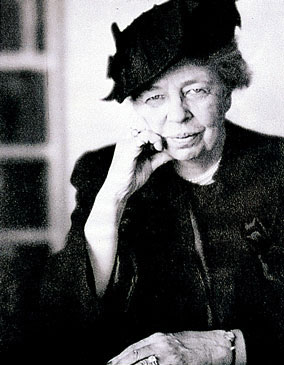| Roosevelt, (Anna) Eleanor (1884-1962), social activist, author, lecturer, and United States representative to the United Nations was the niece of President Theodore Roosevelt (president 1901-09), brother of her father.

Eleanor Roosevelt was born in New York City on October 11, 1884 , to Elliott Roosevelt and Anna Hall Roosevelt, descendants of a prominent family of Dutch ancestry. Eleanor's mother died when she was eight, her father when she was ten. She then lived with her maternal grandmother and at the age of 15 was sent to a boarding school in England .
On her return home she did social work in New York before marrying her distant cousin Franklin Roosevelt on March 17, 1905 .
During the early years of their marriage, she was preoccupied with raising five children and, after her husband's election to the New York Senate (1911), with learning to be a political hostess in Albany and later in Washington. After 1921, she provided help and inspiration for her husband in his struggle with the crippling effects of poliomyelitis. On his physician's advice, she expanded her own role in public affairs in order to renew and stimulate her husband's political interests. She joined the Women's Trade Union League and became active in the state Democratic Party (1924-28) as a means of keeping her handicapped husband's political career alive. When he was elected to the presidency in 1932, Eleanor continued to assist him, and although she held no office, she soon became an influential figure in his administration.
During her 12 years as first lady (1933-45), the unprecedented breadth of her activities and her advocacy of liberal causes made her nearly as controversial a figure as her husband. She instituted regular White House press conferences for women correspondents for the first time. In deference to the president's infirmity, she helped serve as his "eyes and ears" throughout the nation, embarking on extensive tours and reporting to him on conditions, programs, and public opinion. These unusual excursions were the butt of some criticism and "Eleanor jokes" by the political opposition, but many people responded warmly to her compassionate interest in their welfare. For many years, beginning in 1936, she wrote a daily syndicated newspaper column, "My Day."
More liberal than the president, she worked to promote racial equality, and in a famous incident resigned from the Daughters of the American Revolution when the black singer Marian Anderson was denied the use of their facilities. During World War II (1939-1945) she visited American soldiers around the world, championed desegregation of the armed forces, and at the war's end urged admission to Palestine of Jewish refugees from Europe .
Following the death of her husband in 1945, Roosevelt founded Americans for Democratic Action, a liberal group within the Democratic party. During the 1950s she was a strong supporter of party leader Adlai Stevenson. As a U.S. delegate to the United Nations from 1945 to 1953, she chaired the commission that drafted the Universal Declaration of Human Rights. ). She died in New York City on November 7, 1962 . [UP] |

